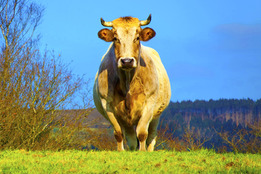astaxanthin
noun
as·ta·xan·thin
ˌa-stə-ˈzan(t)-thən 

: a carotenoid pigment C40H52O4 found in red- or pink-colored aquatic organisms (such as shrimp, lobster, and salmon) and the feathers of some birds that is used especially as a food coloring and dietary supplement
Wild salmon attain their color by absorbing a carotenoid called astaxanthin from their krill-based diet, while farmed salmon eat fish feed supplemented with various sources of astaxanthin to enhance their grayish color.— Cook's Illustrated
Cook's Illustrated
 Cook's Illustrated
Cook's IllustratedAstaxanthin is found in many marine animals, like shrimp and fish, and is also responsible for the pink color of flamingos that feed on crustaceans rich in the pigment.— C. Claiborne Ray
C. Claiborne Ray
 C. Claiborne Ray
C. Claiborne RayLove words? Need even more definitions?
Merriam-Webster unabridged








Share